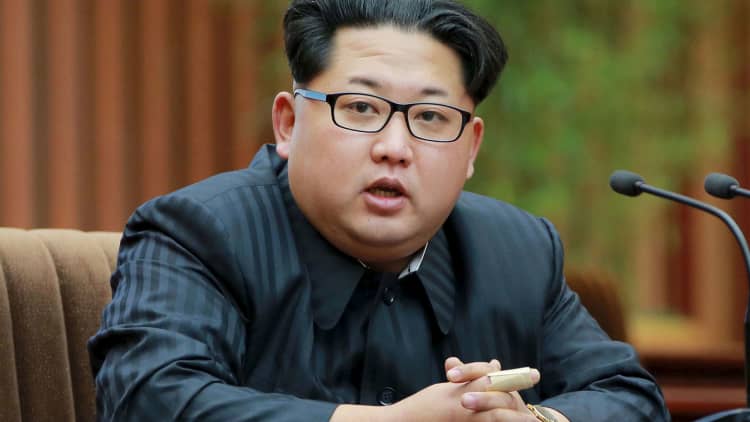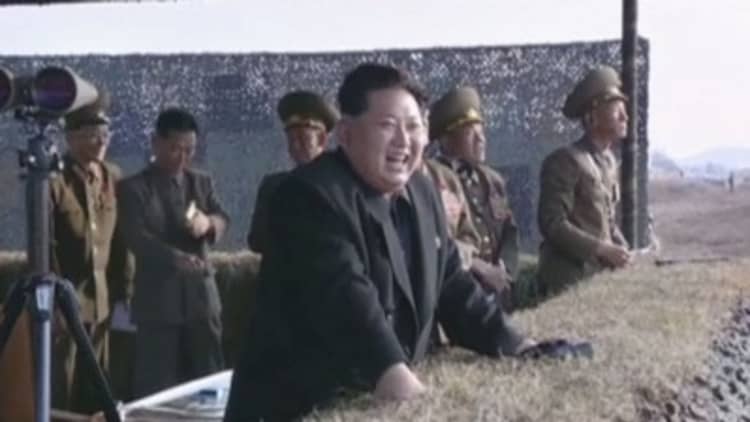
Kim Jong Un of North Korea keeps as many as 200,000 of his own citizens in prison camps. But to Donald Trump, he is a "smart cookie."
Rodrigo Duterte of the Philippines has bragged about killing drug dealers, and has been accused of encouraging thousands of vigilante killings. But President Trump invited him to the White House.
Vladimir Putin is alleged to have ordered the murders of journalists. Trump calls him a strong leader, and says America does a lot of killing, too.
More from NBC News:
North Korea warns region is 'close to nuclear war' amid U.S. drills
Trump and Putin speak by phone, discuss potential personal meeting
'Tortured with electricity': Chechen gay men recount days of abuse
The Trump administration may not have a coherent foreign policy yet, but one theme is emerging: The president seems to have a soft spot for despots.
Experts say Trump's embrace of political strongmen is sending a message that the U.S. is abandoning its longstanding position as a defender of human rights and democracy around the world.
"We're looking at a president who appears to align himself with autocrats, undermine the rule of law and is taking a step back from critical multilateral institutions," said Sarah Margon, Washington director of Human Rights Watch. "He's signaling to partners, allies and even adversaries that human rights are not a key part of his foreign policy."
It's not just Trump's rhetoric. Breaking from years of tradition, Secretary of State Rex Tillerson skipped the State Department's March release of its annual human rights report. He also lifted human rights conditions on the sale of arms to Bahrain, and declined to meet with dissidents on his first trip to Russia. The administration has threatened to quit the UN Human Rights Council, which experts call a flawed body that has nonetheless achieved some gains.

In addition to his warm words for the North Korean and Russian dictators and his invitation to a Philippines leader who has acknowledged personally killing drug suspects as the mayor of a southern city, Trump has also draw criticism for calling Turkish President Recep Tayyip Erdogan last month to congratulate him on a referendum that greatly increased his powers. And Trump has long spoken warmly about Egypt's president, Abdel Fattah el-Sisi, who has presided over a broad crackdown on dissent.
The White House has said little to explain Trump's embrace of unsavory leaders. Defending the praise of Kim, White House spokesman Sean Spicer reminded reporters that he is a head of state. Chief of Staff Reince Priebus suggested that the kind remarks about Duterte were intended to put pressure on North Korea, drawing scoffs from Asia experts.
"Obviously, there's a human rights component that goes into all of this and so it's a balance," Spicer told reporters Monday. "We want to make sure that our country, our people are protected ... This isn't a simple yes-or-no kind of situation."
"We don't care"
"The problem with the invitation to Duterte is that it steps away from a longstanding American practice that elevates human rights and our foreign policy," former acting CIA Director John McLaughlin told NBC News' Andrea Mitchell. "What we're saying to others in the world is we don't care much about human rights. And the next time we try to make the case that we do they'll point to this kind of invitation as the rebuttal saying you're not really serious."
McLaughlin lamented that Trump "seems to admire strength and power in other leaders inordinately. Without looking at the downsides of how they exercise that power."
American foreign policy "always has to be a mix of pragmatism and idealism," he added. "But if the pragmatism and the expediency starts to outweigh the values that we try and project in the world. It almost always leads to trouble…Even though we may need a lot of friends in rough parts of the world, there are ways to get there without elaborately praising them. "
Trump's latest round of praise for international rogues began Saturday night, when Trump issued a late night statement citing a "very friendly conversation" with Duterte and inviting him for a visit.
Then, in comments broadcast Sunday on CBS' Face the Nation, Trump said this about Kim Jong Un:
"He was a young man of 26 or 27 when he took over from his father, when his father died. He's dealing with obviously very tough people."
He added, "A lot of people, I'm sure, tried to take that power away, whether it was his uncle or anybody else. And he was able to do it, so obviously, he's a pretty smart cookie."
What we're saying to others in the world is we don't care much about human rights.John McLaughlinformer acting CIA director
Kim had his uncle executed. Not fed to a pack of wild dogs, as some early stories had it - merely shot to death.
Trump has famously had almost nothing but praise for Putin, even when questioners confront him with the conclusions by Western governments that the Russian leader has ordered the murders of opponents and reporters.
In February, when then-Fox News host Bill O'Reilly pressed Trump about why he respects Putin, O'Reilly said, "But he's a killer though. Putin's a killer."
Trump responded: "There are a lot of killers. We've got a lot of killers. What, do you think our country is so innocent?"
The last president to be heavily criticized for de-emphasizing human rights in U.S. foreign policy was Ronald Reagan. He came into office having run against a Jimmy Carter approach that made human rights central to nearly every policy decision.
But Reagan was operating out of a desire to win the Cold War, and he never stopped criticizing the Soviet Union's human rights record. By the end of his second term, he was credited with a turnaround on human rights. In more recent times, both George W. Bush and Barack Obama sought to promote democracy and punish oppressive regimes.

